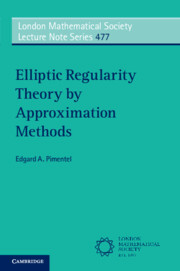1 - Elliptic Partial Differential Equations
Published online by Cambridge University Press: 16 June 2022
Summary
This chapter introduces the basics of elliptic partial differential equations. We detail the notions of viscosity solutions, both in the case of continuous and measurable ingredients, strong solutions, and establish fundamental properties. Those include results on the existence and stability and the Aleksandrov–Bakelman–Pucci estimate. The chapter also details fundamental results in regularity theory, such as the Krylov–Safonov and Evans–Krylov theories, Lin's integral estimates, and Caffarelli's estimates. We introduce approximation methods to establish Hölder continuity of the gradient for fully nonlinear inhomogeneous equations governed by operators with variable coefficients. To finish the chapter, we discuss the so-called counterexamples of Nadirashvili and Vladut, and detail an application. In fact, we prove that a continuous function may satisfy viscosity inequalities driven by the extremal operators but fail to satisfy a uniformly elliptic equation.
- Type
- Chapter
- Information
- Elliptic Regularity Theory by Approximation Methods , pp. 1 - 75Publisher: Cambridge University PressPrint publication year: 2022

